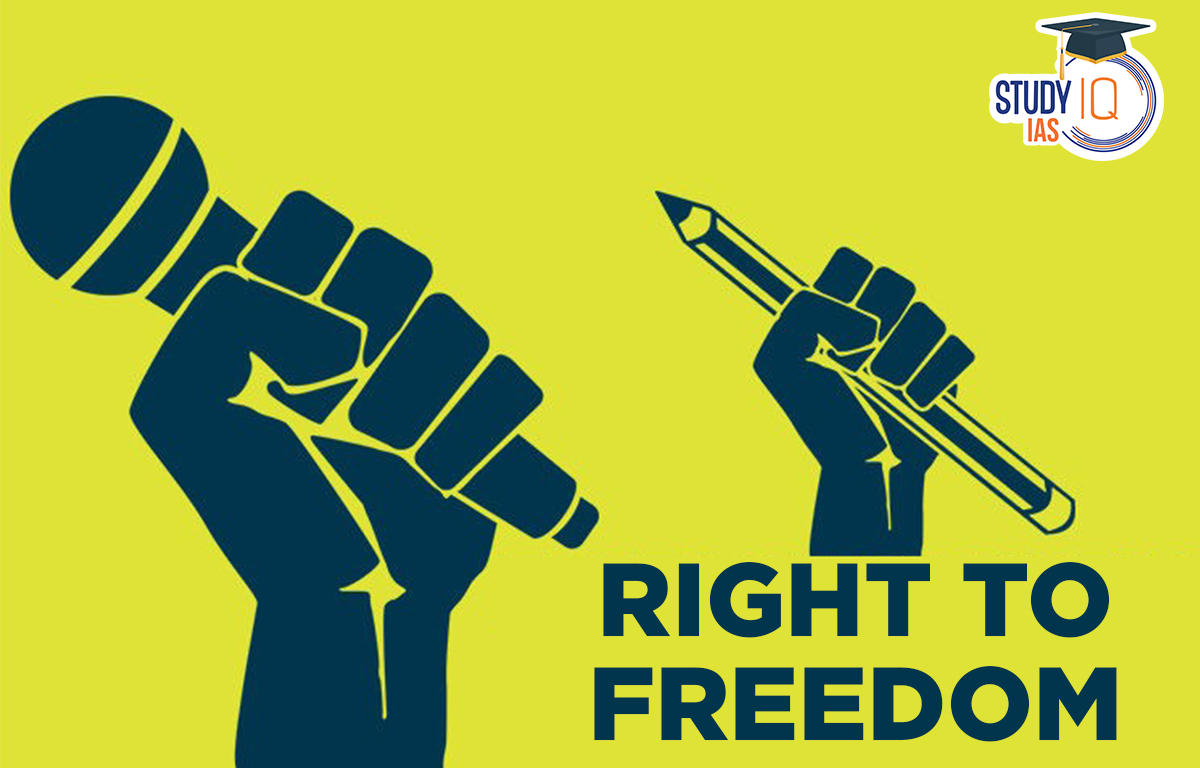Table of Contents
Right to Freedom
Definition of Freedom: The definition of “freedom” is essential “not to be constrained in any way.” The idea of “freedom” is particularly popular among political philosophers in the west. In his work “Two Concepts of Liberty,” British philosopher Isaiah Berlin introduced the concepts of negative and positive freedom.
Negative freedom, according to him, is the capacity to act as one pleases without regard to any restraints from the outside world. Positive freedom, on the other hand, refers to having control over one’s own life and the decisions that are made in it. The distinction between the two is that whereas positive freedom relates to an idea of oneself that is neither constrained nor governed by others, negative freedom denotes the freedom to do or not do something.
Thus, the Right to Freedom encompasses a variety of individual rights such as freedom of movement, freedom of speech and expression, freedom of religion, the freedom to travel, freedom of employment, freedom of self-identity, the freedom to own property, etc.
Read about: Constitution Day of India
Right to Freedom Articles
The fundamental rights protected by Articles 19 to 22 are referred to as the right to freedom in the Indian Constitution. These rights are meant to safeguard the Preamble’s principles of liberty in newly independent India, to end individual injustices, and to ensure that everyone has the right to a life of dignity.
Initially, the Indian Constitution provided seven freedom rights, but the 44th Constitutional Amendment Act 1978 by Indian Government omitted Article 19(1)(f) Right to Acquire, hold and dispose of Property, presently it is under Article 300 A and is reduced merely to a constitutional right.
| Article | Provisions under Constitution |
| Article 19 | Article 19(1)(a) Freedom of speech and expression
Article 19(1)(b) Freedom of assembly Article 19(1)(c) Freedom of association Article 19(1)(d) Freedom of movement Article 19(1)(e) Freedom to residence and settlement Article 19(1)(f) Right to Acquire, hold and dispose of Property (Repealed) Article 19(1)(g) Freedom of profession, occupation, trade or business |
| Article 20 | Protection in Respect to Conviction for Offences |
| Article 21 | Protection of Life and Personal Liberty |
| Article 21 A | Right to Education |
| Article 22 | Protection Against Arrest and Detention |
An individual who possesses the legal status of “citizenship” is entitled to these six freedom rights. Foreign nationals, legal entities, registered companies, and organisations are not entitled to these rights.
Read about: Article 15 of Indian Constitution
Article 19 of Indian Constitution
Right to Freedom of Speech and Expression
Under Article 19 (1)(a) this freedom gives people the freedom to communicate their ideas, beliefs, and points of view verbally, in writing, in the printed form, through images, or in any other way. It serves as the foundation for a stable, democratic society. But that does not imply that one can say whatever one wants. These rights are subject to “reasonable restrictions.”
Although it has not been mentioned specifically, the right to freedom in article 19(1)(a) also has other rights such as the Freedom of the Press, the Right to Information and the Right to remain Silent.
Read about: Article 14 of Indian Constitution
Right to Freedom of Assembly
This freedom right includes the right to Assemble as a group and conduct meetings and processions. These gatherings may have educational as well as political, social, and religious awareness goals. The only requirement was that the gathering’s purpose should not be unlawful; otherwise, it would be considered an “illegal assembly” in violation of Section 141 of the IPC, which states that “an assembly of five or more persons shall be unlawful if its purpose was criminal.” There are two restrictions on this right to assemble, as,
- The Assembly must be without weapons,
- The Assembly must be peaceful.
For the sake of maintaining the public order, sovereignty, and integrity of India, states may also impose some reasonable limits.
Right to Freedom of Association
This freedom includes the ability for a person to come together and create an association or union with the aim of serving a lawful purpose. However, unless their members have participated in the aforementioned violence or any other troubling behaviour, mere participation in the prohibited organisation does not automatically render its members “criminals.”
Political parties, clubs, trade unions, societies, businesses, etc. may be a component of the association. This privilege also extends to the ability to maintain an association and the choice not to join one.
The state can impose reasonable restrictions on the exercise of the freedom of association on grounds of sovereignty and integrity, security, public order and morality.
Right to Freedom of Movement
The freedom to move about without any restrictions is a part of this freedom. However, under Clause (5), the State is permitted to limit this right in a fair manner in order to protect the interests of Scheduled Tribes or the general public. To conserve the culture, customs, language, etc. of indigenous tribes living in various parts of the country, such as Assam and the Northeast, the state is authorised to put reasonable limitations on the movement of foreigners upon entry into the territory inhabited by tribes.
Right to Freedom of Residence and Settlement
The freedom to move to any location in the nation is an element of this freedom. This right is intended to guarantee individuals’ freedom of movement across the nation without internal restrictions and their ability to establish permanent residence anywhere in the nation.
However, this is subject to reasonable restrictions that the State may set to serve the general welfare and safeguard the interests of Scheduled Tribes. As a result, the restriction on habitual criminals’ right to residency was sustained since it was an appropriate restriction in light of everyone’s best interests.
Right to Freedom of Profession, Occupation, Trade or Business
The right to practise any profession and to engage in any occupation, trade, or business is guaranteed to all citizens. This right is extremely broad because it encompasses every source of income. In the public’s best interest, the state may set reasonable limitations on the use of this right.
- Prescribe the professional or technical requirements for engaging in any profession or occupation, trade, or business; and
- Carry on any trade, business, industry, or service by itself, whether or not to the (full or partial) exclusion of citizens.
Read about: 42nd Amendment of Indian Constitution
Article 20 of Indian Constitution
An individual is protected under Article 20 from prosecution for certain offences. It primarily ensures three different sorts of protection, including
- No Ex-post facto laws,
- No Double jeopardy, and
- No Self-incrimination.
Read More: Article 16 of Indian Constitution
Article 21 of the Indian Constitution
According to Article 21, no person may be deprived of their life or personal freedom unless doing so in accordance with a legal process. Both citizens and non-citizens may exercise this freedom.
Prior to the Maneka Gandhi v. Union of India (1978) case, which expanded its ambit and brought about a significant change in the judicial attitude toward the protection of life and liberty of the individual, Article 21 was left dormant. It put out several ideas to give Article 21 additional significance.
Extended view of Article 21: The intriguing evolution of rights has been made possible by the new interpretation of Article 21 in Indian law. It is currently referred to be the “heart of the fundamental rights.” Additionally, it has given recognition to a number of DPSPs that were necessary to be recognised as fundamental rights. Various Fundamental rights under Article 21 as, the right to livelihood, right to privacy, right to education, right to health etc.
Read More: Articles 12 and 13
Article 21 A of the Constitution
According to Article 21 A, all children between the ages of six and fourteen must receive free and mandatory education in a way that the State deems appropriate. Therefore, only primary education not higher or professional education is now a Fundamental Right under this clause.
The 86th Constitutional Amendment Act of 2002 introduced this clause. This amendment marks a significant turning point in the nation’s pursuit of “Education for All.” This action, according to the administration, marks “the beginning of the second revolution in the chapter of citizens’ rights.”
The Constitution already had a clause in Part IV of Article 45 that stated that education for children was free and required. Being a directive concept, it was not, however, upholdable in court. In this case, judicial intervention is now possible. The Parliament passed the Right of Children to Free and Compulsory Education (RTE) Act, 2009, in accordance with Article 21A.
Read More: Salient Features of Constitution of India
Article 22 of the Indian Constitution
Article 22 provides a number of safeguards for the right of the arrested person against arbitrary detention and arrest by the police. Legislation regarding preventative detention may also be passed by the legislature. Article 22 is divided into two parts: the first part addresses cases governed by ordinary law, and the second part addresses cases governed by the laws governing preventive detention.
| Ordinary law | Preventive Detention Law |
| The first section of Article 22 grants the following rights to everyone detained or arrested in accordance with ordinary law:
Right to know the reasons for the arrest. Right to consult a legal practitioner. The right to appear in court, including travel time, within 24 hours. Right to be released after 24 hours until the magistrate authorises further detention. |
Persons who are held or arrested in accordance with legislation requiring preventative custody are protected by the second section of Article 22. Both citizens and non-citizens are entitled to this protection, which includes the following:
|
Read More: Right to Equality
Right to Freedom UPSC
Nelson Mandela once said, “For to be free is to live in a way that respects and strengthens the freedom of others, not just to throw off one’s bonds.”
Therefore, having the right to freedom entails having freedom from all forms of pressure, including mental and physical ones, in every aspect of one’s life. It also states that one is not constrained by anyone. As we exercise the freedoms guaranteed to us by Articles 19 to 22 of our Constitution, we should keep in mind that one’s rights end where another person’s rights begin. Therefore, there are reasonable limitations to prevent people from using their freedom in an illogical or illegal manner.


 SLAPP Suits: Meaning, Examples, Impact o...
SLAPP Suits: Meaning, Examples, Impact o...
 Finance Commission of India, Articles an...
Finance Commission of India, Articles an...
 High Number of Pending Cases in Supreme ...
High Number of Pending Cases in Supreme ...

























